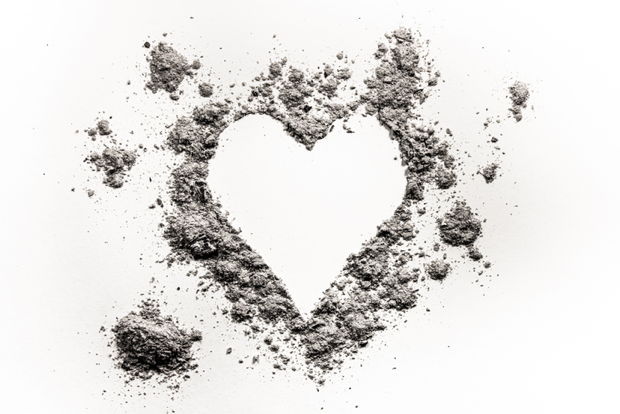
Memory is a strange thing — the way it picks and chooses what to remember, how it distorts and puts the puzzle of real life back together in its own way. On one particular Valentine’s Day in high school, I remember feeling more woman than girl, with a fancy red top. I met my boyfriend (now husband) at the bottom of the stairs, his flowers and photo collage in hand. His jaw dropped. We’d been a couple for six months, which of course is a lifetime in high school romances.
That was what romantic love was then — demonstrative acts of adoration, feeling sexy, clinging to another person to save you. It was fancy dinners and longing.
Love was not yet what it could and would be. It was but a shadow of what Love is.
Love looks different now. This year, twenty Valentine’s Days past that one, I’m going to be spending it in the parking lot of our local elementary school because this year, Valentine’s Day falls on Ash Wednesday. Since our church plant meets at the local elementary school and we can’t get space to meet mid-week, we’re meeting in the parking lot.
As the wife of the pastor, I first asked (not very nicely), “What? For real? We’re meeting in the parking lot?”
Yet, I suppose it makes sense — and in a way that is about more than just scheduling. What other space is as mundane, as common, as the asphalt at a local elementary school?
Ash Wednesday services mark the beginning of Lent — that forty-day journey to the cross and resurrection of Jesus. We will rehearse the truth that we are but dust. We will have ashes from the last year’s palm branches placed in the shape of a cross on our foreheads.
We are distracted and busy creatures, alternately puffing ourselves up with our perceived self-importance and running around too distracted to notice the common ground beneath our feet.
We need to stop, to feel the wait of longing — not for sex, or for friendship, or even for shared mission. We need to practice the stillness of waiting for the good news to which we pin our hopes. We need to feel our creatureliness wash over us like water, our mortality embedded on our foreheads.
We will mark our bodies with the knowledge that we are creature, not creator. We will practice embodied belief as we choose to shape our schedules, our bodies, our time, and our appetites by our spiritual hungers — these hungers that on ordinary days in ordinary time, we push down until they come out in twisted things. On Ash Wednesday, we will bring our hungers to the table and look forward to how they will be filled. But for now, we wait. We wait for Love to show up, to see how Love will make himself known in the waiting, in repentance, in community.
This Ash Wednesday we will remind ourselves what Love is. It is not the red, pink, and candy hearts. It is not physical longing. It is not companionship, or camaraderie, or co-parenting or appreciation. It is not love languages or dating or marriage.
Love is self-sacrifice. It is always poured out for the good of another, but it also bubbles up from a wellspring of belovedness.
So, I will line up behind a bedraggled group of suburbanites in the local elementary school parking lot, trying to wrangle our kids so we can bring all of who we are to be marked by the reminder we too often forget: we are but dust and to dust we shall return.
My husband will look at me, ashes on his fingers, and place the sign of the cross on my forehead, proclaiming that his wife will one day die: “Remember you are but dust and to dust you will return.” One day, all the gains of our specific love — how I’m learning to say “I’m sorry” in better ways, how he looks at me across a room, how I lean in to tell him he’s mine when he’s feeling exposed and vulnerable, how he bounced babies and crawled into cribs with them all because of Love — all those gains will be fading shadows. They will only point to a greater Love.
It is here, in this “dust to dust” that my husband will offer his greatest declaration of love this Valentine’s Day. Not that he loves me in the Hallmark movie sort of way, but rather that in his role as pastor he calls me to Love itself: Jesus.
For what else but Love — love in the everyday and Love made flesh in Christ — could call us back to the true and real things? the reality that we will die? the truth that we are creatures, and not in charge of much in this world? If love reckons with who we really are as creatures, it also calls us to reckon with our identity: we are simultaneously saint and sinner.
What other good news of Love enfleshed is there but one that proclaims our need to come clean? What else is love but a pouring out, a standing naked knowing we have nothing to bring?
Only Love can call us back to who we really are: fragile, dearly loved creatures, sinners and saints. Repentance is God’s good gift to us. We can finally own up to all of who we are.
Why not meet in the parking lot, even just to jolt ourselves awake, to remind us we are but dust?